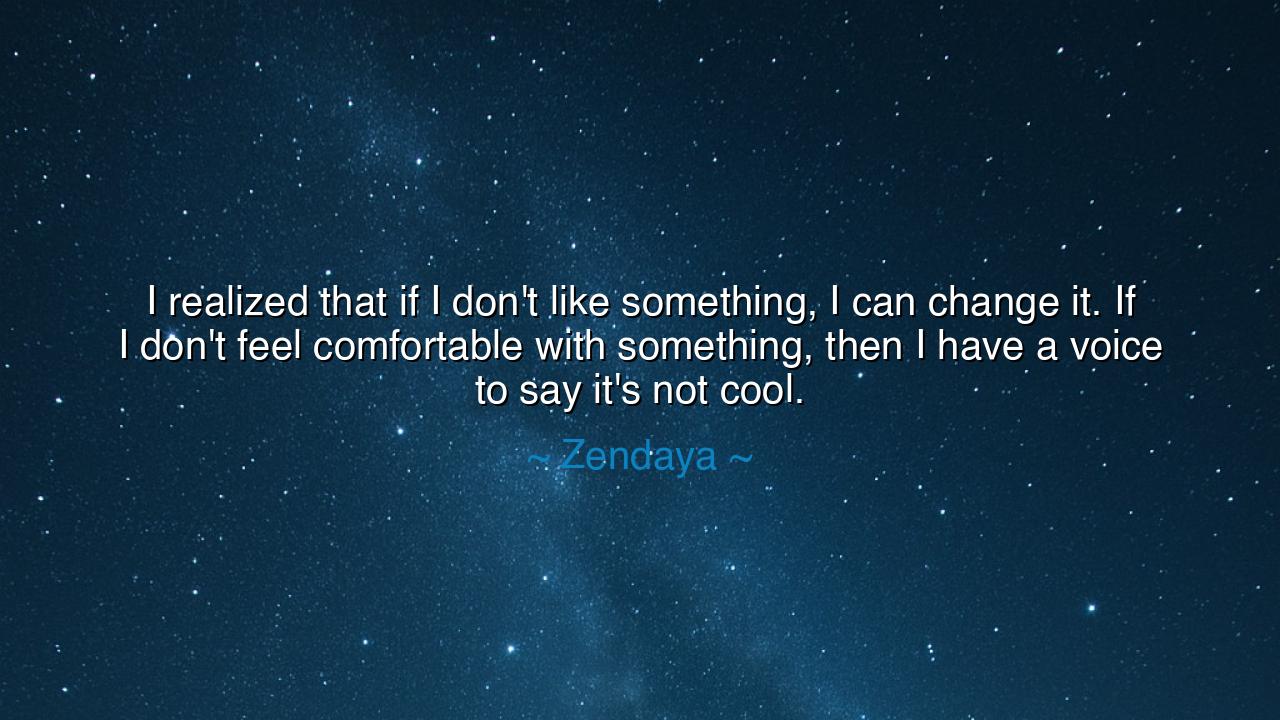
I realized that if I don't like something, I can change it. If I
I realized that if I don't like something, I can change it. If I don't feel comfortable with something, then I have a voice to say it's not cool.






In the empowering words of Zendaya, “I realized that if I don't like something, I can change it. If I don't feel comfortable with something, then I have a voice to say it's not cool,” we are reminded of the inherent power each individual has to shape their own life and to stand up for their values. Zendaya speaks to the idea that agency and self-expression are not privileges, but rights that each of us can claim. To have a voice is to possess the ability to not only recognize when something is wrong but to take action and demand change. This statement is a powerful call to action, urging us to recognize our own power and the responsibility that comes with it.
This idea of personal agency and the right to voice our discomfort has roots in ancient wisdom. Socrates, in his pursuit of truth, famously used his voice to challenge the status quo, to ask uncomfortable questions that made people think critically about their beliefs and actions. Socrates was not one to remain silent when he saw injustice or complacency. He used his voice to question the world around him, often making those in power uncomfortable. His legacy reminds us that true courage is found in speaking up, even when doing so may challenge established norms. Zendaya’s words echo this ancient tradition: when something feels unjust or wrong, we are not only allowed to voice our discomfort, but we are called to do so.
Consider also the story of Harriet Tubman, a woman who exemplified the use of her voice and her actions to fight against the oppressive systems of her time. As an escaped slave, Tubman could have chosen to remain silent and hidden, but instead, she became one of the most fearless leaders of the Underground Railroad, helping others escape to freedom. Tubman used her voice and her action to challenge the system of slavery, demonstrating that even in the face of grave danger, one can rise up and demand what is right. Her example teaches us that when we are uncomfortable with something—when we see injustice or inequality—we too must find the courage to speak out and take action, as she did with such conviction.
The story of Mahatma Gandhi further illustrates the power of using one’s voice to create change. In the face of British rule over India, Gandhi refused to remain silent in the face of oppression. His teachings of non-violent resistance were grounded in the belief that individuals and communities have the power to speak up, to challenge authority, and to demand justice without resorting to violence. Gandhi’s actions were rooted in his voice—his refusal to remain passive in the face of injustice and his dedication to using non-violence as a form of protest. His example reinforces the idea that, as Zendaya suggests, if something is uncomfortable or wrong, we not only have the right to speak out, but we have the responsibility to do so.
The significance of Zendaya’s quote lies in its emphasis on the individual’s power to take charge of their own life and shape their surroundings. In a world that often values conformity, her words stand as a reminder that we all possess the ability to speak up and challenge what does not align with our values. She encourages us to recognize that discomfort is often the first sign of an area in our lives that may require change. Whether it is a personal decision, a social injustice, or a cultural norm that feels off, taking action starts with using our voice. It is a call for self-empowerment, reminding us that no one can make the changes we need but ourselves.
The lesson to take from Zendaya’s words is clear: we are the authors of our own lives, and if we encounter something that makes us uncomfortable or feels wrong, we must use our voice to speak out. Change begins with awareness, and awareness begins with the courage to say, “This is not acceptable.” Just as Socrates questioned the assumptions of his time, Harriet Tubman fought for freedom, and Gandhi led his people to independence, we too can create change by speaking up against what we find unjust, uncomfortable, or wrong.
In practical terms, speaking up does not mean loud confrontation or aggressive opposition, but rather a firm commitment to our own values. It might mean having difficult conversations, challenging societal norms, or simply standing in support of others who need a voice. Whether it’s in our communities, workplaces, or personal relationships, the lesson is to stay true to what we believe in and use our voice to create the future we want to see. Let us be inspired by the wisdom of the ancients and the modern voices of those who have created change, like Zendaya, and speak out for what is right, what is uncomfortable, and what we believe can be better.






AAdministratorAdministrator
Welcome, honored guests. Please leave a comment, we will respond soon